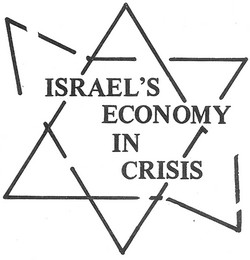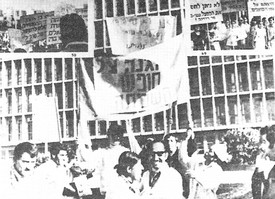

|
Above all, Israel's continued war policy against the Palestinian people and the PLO is the basic reason for this deterioration.
AFTER THE 'PEACE': SOARING MILITARY SPENDING TAX EVASION
Soaring military needs which account for more than 41% of the Gross National Product are reflected in the unbalanced budget the Israeli government presents to the Knesset every year. To meet defence expenditures, the Israeli government has had to impose high taxes. The Israeli government also plans from time to time to impose further indirect taxes to cover the trade deficit of 5.8 billion dollars, a figure which is still going up. The Israelis are now the most highly taxed people in the world. They have been going through a period of belt-tightening and unemployment for a long time now. Tax evasion has reached such stunning proportions that government officials have considered wiping the slate clean and drawing up new tax rolls.
FOREIGN TRADE DEFICIT, INDEBTEDNESS, LACK OF INVESTMENT
Due to its parasitical structure in the service of imperialism, the Zionist state had always been importing more that it exported. But this year, the annual balance-of-trade deficit is expected to reach a new record level of about $ 5 billion. At the same time, Israel's overall foreign debts also will reach a new peak amounting to over $ 14 billion, showing the complete dependence of the Zionist state on its masters in the U.S.
The symptoms of Israel's economic crisis include declining confidence from foreign investors. Last year, foreign investments in Israel stood at $ 74.7 million, but during the same period $ 97.4 million was taken out of Israel - 40.4 million dollars by foreign investors who have taken to new fields and 57 million dollars by Israelis investing in foreign countries. State loans for the same period jumped another 1.5 billion dollars to reach 11.8 billion dollars.
100 % INFLATION SHARP RISE IN BASIC FOOD PRICES

|
For the popualtion, all this means a drastic reduction in living standards. Basic food prices have increased by 45 to 50 percent and prices of wheat and other cereals have increased by 40 percent, while the price of flour has increased by 28 percent. (60 kilos of flour are sold at 460 Israeli liras).
Electricity rates have increased by 28 percent and fuel by 40 percent. The Israeli Ministry of Finance has also said that public transport fares will rise by 25 percent, while prices of bread, frozen chickens, oil, milk and dairy products will rise by 45 percent.
GROWING LABOUR AND SOCIAL UNREST, POLITICAL DESTABILIZATION
To protest the unbearable economic situation, the soaring costs of living and, above all, the sharp increase in unemployment figures, there are frequent walkouts by teachers, factory workers, engineers, nurses and bus drivers in protest against the deteriorating economic situation and the high cost of living in addition to lack of security.
To protest the government's cuts in subsidies effective August, 1, which aim to save the government 153 million dollars a year, more than one million workers, about a third of the population of Israel, staged a two-hour strike on August 13 which was observed by 90 percent of the country's work force, according to the Histadrut trade union federation. Employees of the civil aviation administration stopped work for five hours, grounding all incoming and outgoing planes and leaving thousands of passengers stranded at Lydda airport. A coincidental strike by electric corporation employees demanding improved working conditions turned off traffic lights throughout the country. A vast amount of preserved foods was spoiled while huge traffic jams built up on the main roads.

Laborers protest deteriorating working and living
conditions |
The economic situation has, of course, affected Israeli politics. Most members of the Histadrut Party are seeking the downfall of Begin and his ruling Likud coalition, whom they consider responsible for Israel's poor economic performance. Differences between Israeli leaders have increased, especially between Foreign Minister Moshe Dayan and Defence Minister Ezer Weizman. The cabinet cannot agree on the measures necessary to cope with this disastrous situation.
The Israeli economy is sharing in the general malaise of the world capitalist system, but its problems are aggravated by the role it must play as a regional garrison state for imperialism. Even with massive US support, the Israeli economy is being asked to deliver far more than it possibly can produce and thus, by one of those ironies that fill the pages of history, Israel is now becoming a victim of that very imperialist system which it served and profited from so well for so long.
Regrettably, Chief Rabbi Yosef's pronouncement is unlikely to affect Israeli government policy, which is Ashkenazi-dominated and considers religious law as only one of its sources. But it raises interesting moral questions and further emphasises the importance of the largely suppressed voice of the Sephardic community.
Contact us: New Jersey Solidarity - Activists for the Liberation of Palestine
(973) 954-2521
info@newjerseysolidarity.org
http://www.newjerseysolidarity.org
New Jersey Solidarity
344 Grove Street, Suite 131
Jersey City, NJ 07302